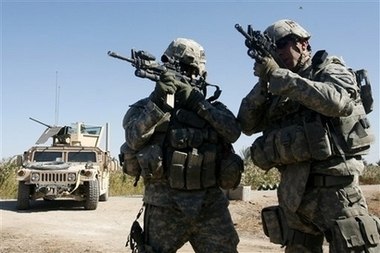US, Iraq deal sees long-term US presence
Updated: 2007-11-27 10:51
Washington -- US President Bush on Monday signed a deal setting the foundation for a potential long-term US troop presence in Iraq, with details to be negotiated over matters that have defined the war debate at home -- how many US forces will stay in the country, and for how long.
|
|
The agreement between Bush and Iraqi Prime Minister Nouri al-Maliki confirms that the United States and Iraq will hash out an "enduring" relationship in military, economic and political terms. Details of that relationship will be negotiated in 2008, with a completion goal of July, when the US intends to finish withdrawing the five combat brigades sent in 2007 as part of the troop buildup that has helped curb sectarian violence.
"What US troops are doing, how many troops are required to do that, are bases required, which partners will join them -- all these things are on the negotiating table," said Lt. Gen. Douglas Lute, US President Bush's adviser on the wars in Iraq and Afghanistan.
The proposal underlines how the United States and Iraq are exploring what their relationship might look like once the US significantly draws down its troop presence. It comes as a Democratic Congress -- unsuccessfully, so far -- prods Bush to withdraw troops faster than he wants.
Bush and al-Maliki signed the new US-Iraq "declaration of principles" during a secure video conference Monday morning.
Al-Maliki, in a televised address, said his government would ask the United Nations to renew the mandate for the multinational force for one final time with its authorization to end in 2008.
The US-Iraq agreement will replace the present UN mandate regulating the presence of the US-led forces in Iraq. Al-Maliki said the agreement provides for US support for the "democratic regime in Iraq against domestic and external dangers."
It also would help the Iraqi government thwart any attempt to suspend or repeal a constitution drafted with US help and adopted in a nationwide vote in 2005. That appeared to be a reference to any attempt to remove the government by violence or in a coup.
Al-Maliki said the renewal of the multinational forces' mandate was conditional on the repeal of what he called restrictions on Iraqi sovereignty introduced in 1990 by the UN Security Council to punish Iraq for invading neighboring Kuwait.
The new agreement would not signal an end to the US mission here. But it could change the rules under which US soldiers operate and give the Iraqis a greater role in determining their mission.
|
|
|
||
|
||
|
|
|
|


